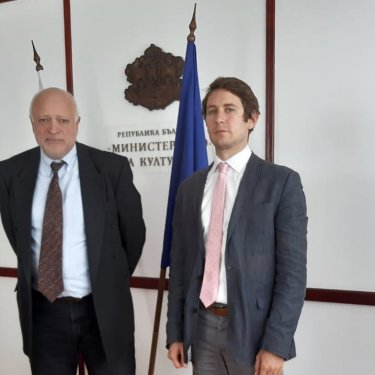RSF visits Bulgaria, calls for press freedom “crisis exit plan”

A representative of Reporters Without Borders (RSF) appealed to Bulgarian state authorities and politicians during a visit to Sofia to support media outlets that disseminate reliable news and information and to make trustworthy journalism a key issue in the campaign for November’s parliamentary elections.
As Bulgarians prepare to go to the polls for the third time in seven months in November, this time to elect both a parliament and president, Pavol Szalai, the head of RSF’s European Union and Balkans desk, made a two-day visit to Sofia on 23 and 24 September to press for a concerted effort to defend the right to news and information.
“The right to news and information is experiencing a major crisis in Bulgaria,” Szalai said in his address to the New Horizons in Journalism conference in Sofia on 24 September. “We need a crisis exit plan that guarantees trustworthy information and supports those who produce and disseminate it – journalists. In a country ravaged by the coronavirus and by corruption in the allocation of European funding, access to reliable coverage of public policy is more than ever in the general interest of both Bulgarians and all Europeans.”
Bulgaria combines all of the problems for press freedom that exist in various parts of Europe – physical attacks and smear campaigns against journalists; impunity for crimes of violence against reporters and judicial harassment; public media bias, especially in the run-up to elections; corruption, disinformation and lack of transparency about media ownership; media pluralism threatened by ownership concentration; and bias and opaqueness in the distribution of state aid to the media, to the detriment of independent media outlets.
As a result, Bulgaria is ranked lower than any other European country in the World Press Freedom Index, as Dutch MEP Sophie in t’Veld recognized in Sofia on 24 September while leading a European parliamentary delegation that was looking at the rule of law and press freedom in Bulgaria.
While in Sofia, RSF advocated to officials and leading national politicians for concrete measures to encourage reliable reporting and to support independent Bulgarian media outlets. “We have presented strong recommendations and now we ask you to take the actions that are permitted by your position,” Szalai said during a meeting with culture minister Velislav Minekov.
Minekov is part of an interim government that was appointed pending new parliamentary elections and, as such, regardless of RSF’s recommendations, is supposed to enforce the rules in effect, including those concerning the transparency of media ownership and the allocation of European and national funding for the media.
RSF asked Minekov to sanction media outlets that do not respect their legal obligations to declare income from public funding and certain donors in a dedicated central register. The failure to verify compliance with these requirements creates unfair market conditions, exposes independent media donors to arbitrary prosecution and ends up undermining media outlets that don’t depend on state funding and respect their legal obligations.
Szalai also asked the culture minister to begin creating a transparent and fair system for allocating state advertising according to indicators of reliability and independence such as those provided in machine-readable form by the Journalism Trust Initiative, an initiative developed by RSF to promote reliable news and information.
The interim government has revealed that, from 2017 to 2021, Bulgarian media outlets received 5 million euros in European funded advertising placed by the national authorities. All possible light must be shed on these questionable practices. RSF asked the culture minister for an investigation into a public awareness campaign about the various forms of addiction that may have been used to channel funding to media that support the GERB, the former ruling party, at the expense of independent media, thereby undermining media pluralism.
The Bulgarian media landscape is marked by a strong presence of newspapers and websites that pump out disinformation and are controlled by oligarchs often close to certain political parties. During a meeting with members of the Electronic Media Council (CEM), the public regulator, Szalai asked the CEM to take measures to rein in the dissemination of disinformation, by using its legal authority to enforce the Bulgarian Media Ethics Code, which was written by the media themselves.
Szalai also asked the CEM enforce the independence of Bulgaria’s public broadcast media, especially public television, which distinguished itself by its support for the then government during the snap elections held in July.
During this visit, RSF also met with several leading political parties that are running in the 14 November elections and have so far failed to form a government. RSF asked them to make trustworthiness of information a key issue in their campaigns and, if elected, to consider implementing the recommendations that RSF made with the help of Bulgarian experts last March. They include measures to improve the physical safety of journalists and protect them against judicial harassment, including abusive lawsuits.
“Encouraging the right to reliable news and information must be an absolute priority,” Szalai said. “In its absence, it is impossible to combat Covid-19 or corruption. Professional journalism must be supported by acting now before it is too late.”
Bulgaria is ranked 112th out of 180 countries in RSF's 2021 World Press Freedom Index.



